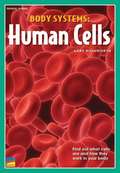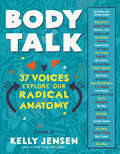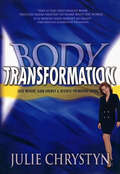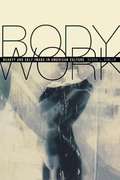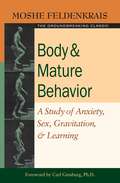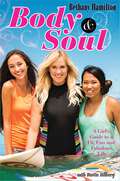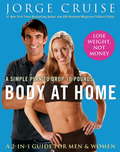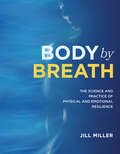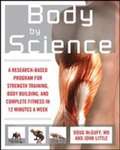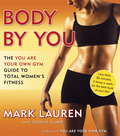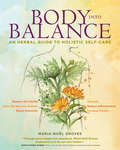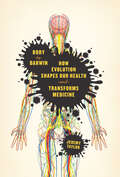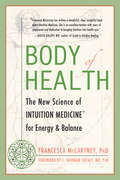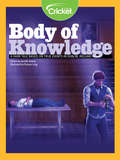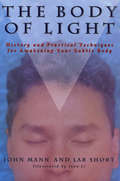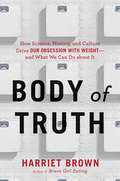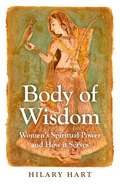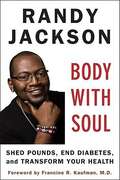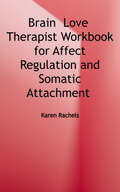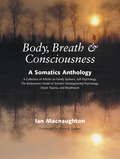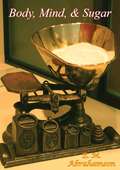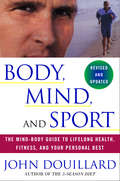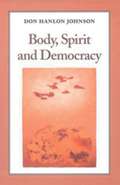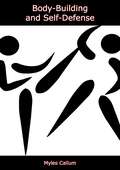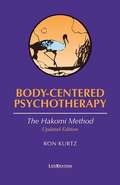- Table View
- List View
Body Talk: 37 Voices Explore Our Radical Anatomy
by Kelly JensenIt&’s time to bare it all about bodies! We all experience the world in a body, but we don&’t usually take the time to explore what it really means to have and live within one. Just as every person has a unique personality, every person has a unique body, and every body tells its own story. In Body Talk, thirty-seven writers, models, actors, musicians, and artists share essays, lists, comics, and illustrations—about everything from size and shape to scoliosis, from eating disorders to cancer, from sexuality and gender identity to the use of makeup as armor. Together, they contribute a broad variety of perspectives on what it&’s like to live in their particular bodies—and how their bodies have helped to inform who they are and how they move through the world. Come on in, turn the pages, and join the celebration of our diverse, miraculous, beautiful bodies!
Body Transformation: Lose Weight, Gain Energy & Reverse Premature Aging
by Julie ChrystynBody Transformation is not just another fad diet that offers great promise today but delivers only disappointment tomorrow. Rather, this book describes a way of eating and a lifestyle that with each passing day brings you closer to your ideal weight, optimal health, highest energy, and longevity. In this groundbreaking work, you will discover the secrets of:How to eat more and weigh lessHow to identify life-generating food vs. life-destroying foodHow to use food to regenerate your body and extend your lifeHow to use your mind to improve your bodyHow to use your body to improve your mindChoose you today and learn the secrets to achieve your goals for ultimate self-care and restoration of health and vitality.
Body Work: Beauty and Self-image in American Culture
by Debra L. GimlinBody Work examines four sites of "body work" -- a hair salon, an aerobics studio, a plastic surgery clinic, and the National Organization to Advance Fat Acceptance -- to show that women can create spaces of autonomy from within the system of beauty ideology, while neither rejecting that ideology nor clearly challenging it.
Body and Mature Behavior: A Study of Anxiety, Sex, Gravitation, and Learning
by Moshe Feldenkrais Carl GinsburgA victim of debilitating injuries, Moshe Feldenkrais was intimately aware of the link between bodily suffering and mental health. Through healing himself, he made revolutionary discoveries, culminating in the development of the method that now bears his name. In an intellectually rich and eloquent style, Feldenkrais delves into neurology, prehistory, child development, gravity and anti-gravity, reflexive versus learned behavior, the effects of emotion, especially anxiety, on posture, and most importantly, the inseparability of body and mind.
Body and Soul: A Girl's Guide to a Fit, Fun and Fabulous Life
by Bethany Hamilton Dustin DillbergREAD and HEAR Edition: Bethany Hamilton has become a fitness expert by virtue of being a professional athlete who has excelled—and she's done it while overcoming incredible challenges. Whether you know Bethany or not, whether you surf or not, everyone has challenges, and in Surfer Style, Bethany shares some of her core experiences with body, mind and spirit. Sharing her expertise as an athlete, New You helps young girls develop a healthy lifestyle, understand their changing bodies, gain confidence, and establish a pattern of healthy living starting at a young age. This book includes workouts specially developed for young girls by Bethany’s personal trainer, recipes and information on healthy eating based on “Bethany’s food pyramid,” which follows the Mediterranean diet, and advice on deepening your spiritual health, for a total body wellness book perfect for growing girls. This isn't a book about Bethany, this is a book about wellness, becoming your best “you,” through physical and spiritual balance, because spiritual health is just as important as physical health.
Body at Home: A Simple Plan to Drop 10 Pounds
by Jorge CruiseIn this two-in-one guide, bestselling author Cruise offers women a guaranteed plan for slimming trouble zones; in the second half, men can find an effective plan for building a strong upper body and core.
Body by Breath: The Science and Practice of Physical and Emotional Resilience
by Jill MillerIn the hierarchy of life, breath always wins. It persists 22,000 times daily, but you get to decide whether the way you breathe is to your benefit or detriment.Breath becomes compromised by stress, disease, and the environmental trappings of progress; you can still breathe under this pressure, but it leads to poor breathing habits that slowly whittle away at your health. In Body by Breath, bestselling author Jill Miller takes you on a journey through your breathing body and presents more than 100 step-by-step techniques and practices to help you master the body-breath connection and reset your physiology.This book explores four primary types of resilience-building exercises—breathwork, movement, rolling, and non-sleep deep rest—to help you achieve• Greater power, endurance, and recovery ability• Enhanced self-regulation skills• Supercharged executive function• Relief from pain, injuries, and chronic conditions• Freedom to feel, connect, and express stored emotionsJill shares her scientifically supported methods so you canTrain and modulate your body and nervous system for reduced stress, improved mobility, and whole-body resilienceDiscover the latest findings in breath and fascia research and get the most out of breathwork practice by including more of your body&’s parts in the mixMap the vast reach of the diaphragm and feel how it intermingles with everything in your body. You&’ll travel the pathways of the vagus nerve and trace miles of fascial intersections beneath your skin to unlock your body&’s regenerative reservoir.If you have struggled with traditional meditation practices because remaining still spikes your anxiety and leaves you feeling agitated and fidgety, Body by Breath presents innovative alternatives designed for your unique nervous system. This inclusive approach allows you to reap the benefits of relaxation, restoration, and regeneration.Take these practices into your life and renew the way you embody breath.
Body by Science: A Research-based Program for Strength Training, Body Building, and Complete Fitness in 12 Minutes a Week
by John R. Little Doug McguffBuilding muscle has never been faster or easier than with this revolutionary once-a-week training program. In Body By Science, bodybuilding powerhouse John Little teams up with fitness medicine expert Dr. Doug McGuff to present a scientifically proven formula for maximizing muscle development in just 12 minutes a week. Backed by rigorous research, the authors prescribe a weekly high-intensity program for increasing strength, revving metabolism, and building muscle for a total fitness experience.
Body by You
by Joshua Clark Mark LaurenBURN FAT, NOT TIME The ultimate get-in-shape-fast, at-home, no-equipment-required program designed especially for women--from the ultra-fit Special Operations trainer and author of You Are Your Own Gym Say goodbye to long, tedious hours at the gym and boring, muscle-depleting cardio exercises. Elite trainer and fitness guru Mark Lauren is here to show you that the best--and only--equipment you need to get in shape is free and always accessible: your own body. This quick and easy program will save you time, money, and maybe your life. In less than thirty minutes, three times a week--and with no machinery or weights--you can achieve the toned arms, flatter abs, tighter buns, and killer legs you've always wanted. You won't build bulk, you'll build strength, and turn your body into a fat-burning machine. Featuring 120 different exercises in five movement categories--Pulling, Squatting, In-Line Pushing, Perpendicular Pushing and Bending--and with three ascending levels of difficulty, Body by You ensures that you'll never get bored by the same static workout. And with such a small time commitment--less than one percent of your time every week!--it is a fun program that can be effortlessly incorporated with your work and family plans. With Mark Lauren as your motivational guide and nutritional coach, Body by You will help you meet your individual fitness goals. Ultimately, it's not about moving through the gym with ease, it's about moving through your life with ease--leaner, stronger, more confident, and with more energy.
Body into Balance: An Herbal Guide to Holistic Self-Care
by Maria Noel GrovesSilver Nautilus Book Award Winner for Health & Healing An antacid or an aspirin may soothe your pain, but it doesn’t cure the cause of your symptoms. Headaches, indigestion, fatigue, allergies, anxiety, eczema, high blood pressure, and other conditions are clues to a deeper imbalance in your body, and learning to read those clues is a key step in maintaining optimal health. <P><P>Herbalist Maria Noël Groves shows you how to read your body’s signals and support your own wellness with herbal remedies and other natural treatments. You’ll learn how each of your major body systems — respiratory, digestive, immune, nervous, memory, reproductive, circulatory, and more — optimally functions, and you’ll discover how to use natural remedies to nourish and repair problem areas, restore lost vitality, support your body as a whole, and prevent future problems. <P><P>Groves includes in-depth instructions, with step-by-step photographs, for making your own herbal remedies, as well as expert guidance on buying and effectively using commercial preparations.
Body of Darwin: How Evolution Shapes Our Health and Transforms Medicine
by Jeremy TaylorWe think of medical science and doctors as focused on treating conditions whether it s a cough or an aching back. But the sicknesses and complaints that cause us to seek medical attention actually have deeper origins than the superficial germs and behaviors we regularly fault. In fact, as Jeremy Taylor shows in "Body by Darwin," we can trace the roots of many medical conditions through our evolutionary history, revealing what has made us susceptible to certain illnesses and ailments over time and how we can use that knowledge to help us treat or prevent problems in the future. In "Body by Darwin," Taylor examines the evolutionary origins of some of our most common and serious health issues. To begin, he looks at the hygiene hypothesis, which argues that our obsession with anti-bacterial cleanliness, particularly at a young age, may be making us more vulnerable to autoimmune and allergic diseases. He also discusses diseases of the eye, the medical consequences of bipedalism as they relate to all those aches and pains in our backs and knees, the rise of Alzheimer s disease, and how cancers become so malignant that they kill us despite the toxic chemotherapy we throw at them. Taylor explains why it helps to think about heart disease in relation to the demands of an ever-growing, dense, muscular pump that requires increasing amounts of nutrients, and he discusses how walking upright and giving birth to ever larger babies led to a problematic compromise in the design of the female spine and pelvis. Throughout, he not only explores the impact of evolution on human form and function, but he integrates science with stories from actual patients and doctors, closely examining the implications for our health. As Taylor shows, evolutionary medicine allows us think about the human body and its adaptations in a completely new and productive way. By exploring how our body s performance is shaped by its past, "Body by Darwin" draws powerful connections between our ancient human history and the future of potential medical advances that can harness this knowledge. "
Body of Health: The New Science of Intuition Medicine for Energy and Balance
by Francesca McCartneyphysical, and mental. The techniques covered here are designed to help readers increase their understanding of intuition, color, the chakra system, meditation, and other theories and methods as they work in healing. The author has developed these techniques over many years of helping nurses, doctors, and other medical practitioners discover the sources of pain and disease and guiding patients to more effective healing therapies. The areas covered in this wide-ranging yet accessible book include aura, color, meditation, and affirmations and their role in healing. Each chapter examines one energy practice and offers examples, stories, and simple techniques that readers can use to test the concept. Included are descriptive charts, journal writing exercises, success stories, and step-by-step meditations.
Body of Knowledge: A Dark Tale Based on True Events in Dublin, Ireland
by Jennifer MasonTake a daunting journey into the "dissection theater." This fictional story will give you chills and thrills while presenting you with a plausible moral dilemma.
Body of Light
by Lar Short Juan Li John MannCombining easy-to-read scholarship with step-by-step practices, and Lar Short have created a unique resource for all spiritual seekers. By examining Hindu, Buddhist, Taoist and other traditions for information on the subtle body, the authors lead us to a better understanding of the inner workings of all spiritual traditions. Liberally illustrated with line drawings and comparative tables the second half of The Body Light is devoted to a sequence of practical exercises, drawn from a wide variety of traditions, that you can immediately use to begin or to broaden your own spiritual practice.
Body of Truth: How Science, History, and Culture Drive Our Obsession with Weight -- and What We Can Do about It
by Harriet BrownOver the past twenty-five years, our quest for thinness has morphed into a relentless obsession with weight and body image. In our culture, "fat" has become a four-letter word. Or, as Lance Armstrong said to the wife of a former teammate, "I called you crazy. I called you a bitch. But I never called you fat. " How did we get to this place where the worst insult you can hurl at someone is "fat"? Where women and girls (and increasingly men and boys) will diet, purge, overeat, undereat, and berate themselves and others, all in the name of being thin? As a science journalist, Harriet Brown has explored this collective longing and fixation from an objective perspective; as a mother, wife, and woman with "weight issues," she has struggled to understand it on a personal level. Now, in Body of Truth, Brown systematically unpacks what's been offered as "truth" about weight and health. Starting with the four biggest lies, Brown shows how research has been manipulated; how the medical profession is complicit in keeping us in the dark; how big pharma and big, empty promises equal big, big dollars; how much of what we know (or think we know) about health and weight is wrong. And how all of those affect all of us every day, whether we know it or not. The quest for health and wellness has never been more urgent, yet most of us continue to buy into fad diets and unattainable body ideals, unaware of the damage we're doing to ourselves. Through interviews, research, and her own experience, Brown not only gives us the real story on weight, health, and beauty, but also offers concrete suggestions for how each of us can sort through the lies and misconceptions and make peace with and for ourselves.
Body of Wisdom: Women's Spiritual Power and How it Serves
by Hilary HartA chakra in our breasts that emits spiritual nourishment into life... a secret substance in our bodies to heal the earth... a direct connection from our wombs to the creative center of the universe... In Body of Wisdom, Hilary Hart identifies nine hidden powers alive in women's bodies and instincts, waiting to be used in contemporary challenges such as the creation of community, healing of the earth, and the restoration of life's spiritual nature. Based on interviews with the world's most visionary spiritual teachers and women's dreams and experiences, Body of Wisdom ushers in a new spirituality in which the body and the shared body of the earth are known as a seat of mystical power and women take responsibility for spiritual work that only they can do.
Body with Soul
by Randy JacksonFrom beloved American Idol judge a complete, inspiring wellness plan for taking control of your health The obesity epidemic is spreading throughout America, bringing with it health problems from diabetes to hypertension to heart disease. A lifetime of poor fitness and nutrition choices left Randy Jackson lethargic, overweight, and with a diagnosis of Type II diabetes. After years of yo-yo diets, hours in the gym, and even gastric bypass surgery, Randy finally decided to change his life. Body with Soul is his tried-and-true wellness plan; filled with meal plans, re-tooled recipes of Southern favorites, and workouts for people on the go, the regimen here is user-friendly and promises results. Having lost one hundred pounds, Randy is healthier than ever, and his diabetes has been in remission for five years. The program offered by Body with Soul ensures that readers, like Randy, can get their health in check, and lead happier, healthier lives. .
Body, Brain, Love: A Therapist's Workbook for Affect Regulation and Somatic Attachment
by Karen RachelsThis book is a first-of-its-kind contribution to the dynamic and unfolding world of body-brain integration. This workbook accessibly integrates three critical areas of therapeutic work brought to us by the Decade of the Brain: 1) brain-based attachment theory, 2) the neuroscience of affect regulation, and 3) practical somatic skills to grow clients' brains. Therapists have the opportunity to view their own experiences through the lens of neuroscience including their own dysregulation and how their attachment strategies interweave with the attachment strategies of clients. By offering a more experiential and somatic way to absorb the information, learning is easy and immediately applicable for therapists seeking to effect transformation with clients. This book bridges mindfulness and neuroscience-based self-help books with the more academic, didactically-focused books for therapists. It uses a self-help format but is, in fact, for therapists. Post-tests, charts with clarifying exercises, specific self-focused exercises, games, case vignettes, and a complete session transcript all facilitate learning in both a cognitive and experiential manner. The author has brought this vital information to therapists in a style that easily teaches practitioners necessary and effective 21st Century skills which enhance compassion and self-compassion, and create authentic therapeutic relationships.
Body, Breath, and Consciousness
by Peter A. Levine Ian MacnaughtonThe forces that develop the self--somatic, emotional, mental, interpersonal, social, and spiritual--must all be considered by therapists in treating any patient. Each article in this important anthology deals in some way with these various elements. The writing is focused on the body-mind connection, exploring the practices and theories of this popular branch of psychology. Topics include the significance of family systems; dealing with trauma and shock in therapy; and the importance of breathing, offering valuable insights for the student and practitioner alike. Contributors include Marianne Bentzen, a trainer in Somatic Developmental Psychology; Peter Bernhardt, a professor of psychology; and Peter A. Levine, author of Waking the Tiger.
Body, Mind, & Sugar
by Dr E. M. AbrahamsonSTARTLING FACTS ABOUT "SUGAR STARVATION"As many as one out of five Americans may be suffering needlessly from a disease that a simple change in diet can cure or prevent. The disease, SUGAR STARVATION or hyperinsulinism, along with its companion disorder hypoglycemia, holds the key to an amazing range of mental and physical conditions.It has been called "THE MASQUERADER" because its symptoms disguise themselves as neurosis, migraine headaches, insomnia, allergies, fatigue, EVEN SUICIDAL DEPRESSION!NOW BODY, MIND, & SUGAR, hailed upon publication as a major scientific breakthrough of vital importance, tells of the extraordinary role that blood sugar plays in the mechanism that keeps body and mind in healthy balance.It shows, through case histories, how low blood sugar can be misdiagnosed, and, as a consequence, dangerously ignored.Finally, this clear, highly readable book gives you the simple diets which have been used successfully in the treatment of sugar starvation--DIETS THAT YOU CAN EASILY FOLLOW!
Body, Mind, and Sport: The Mind-Body Guide to Lifelong Health, Fitness, and Your Personal Best
by John DouillardUntil recently, the effortless "Zone" of peak performance was only within the reach of serious athletes. Now, with Body, Mind, and Sport, anyone can reach the Zone, regardless of fitness level. Designed to accommodate a variety of individual fitness needs, the Body, Mind, and Sport program is split into two levels. Level 1 is for non-athletes who want to improve overall fitness; Level 2 is for those who want to train for competitive or recreational purposes. Your own unique mind-body type is taken into account to guide you in achieving your personal best without stress or strain. In this revised and updated edition of Body, Mind, and Sport, fitness expert and trainer John Douillard outlines a program in which your individual seasonal constitution-Winter, Spring, or Summer-determines what exercises or sports are best suited to your mind-body type and what foods you should eat for optimum results.Using the Body, Mind, and Sport approach you can decrease heart and breath rates while improving both fitness and performance. Dozens of world-class athletes, including Martina Navratilova and Billie Jean King, have used John Douillard's expert breathing techniques, dietary recommendations, and seasonally balanced workouts. Now you can, too!From the Trade Paperback edition.
Body, Spirit and Democracy
by Don Hanlon JohnsonBody, Spirit and Democracy addresses how we, of different ethical values, spiritual commitments, and ethnic backgrounds, can work together to create a more humane world.
Body-Building and Self-Defense: Everyday Handbooks, No. 258
by Myles Callum Ira MandelbaumThis book presents methods for building muscular strength and an attractive masculine physique, for using strength and increasing skill and endurance in athletic performance or gymnastic competition, and for learning and applying the traditional methods of self-defense. Inherent in developing strength and the ability to defend oneself is the building of confidence, the calm, quiet confidence of the person trained in the Oriental arts of self-defense—by means of which one reacts to attack but never provokes physical reaction.The body-building programs are comprised of “muscle tension” exercises, setting-up exercises, tumbling, gymnastics, and weight-lifting. The fundamental rolls, stands, springs, bends, flips are presented before the basic throws and releases of the Oriental systems of self-defense, among them judo, jiu-jitsu, karate. The exercises and movements are illustrated by photographs of athletes in actual work-outs.
Body-Centered Psychotherapy: The Hakomi Method
by Ron KurtzAn inspiring book to both therapists and laymen, also useful to anyone interested in the body-centered movement in psychotherapy. The Hakomi Method integrates the use of mindfulness, nonviolence, meditation, and holism into a highly original amalgam of therapeutic techniques. Hakomi work incorporates the idea of respect for the wisdom of each individual as a living organic system, organizing matter and energy to maintain its goals and identity.
